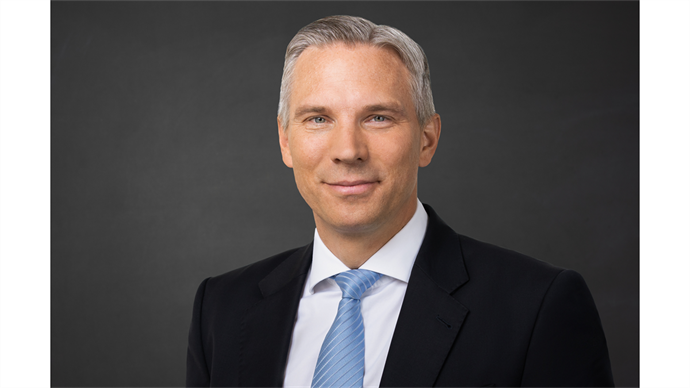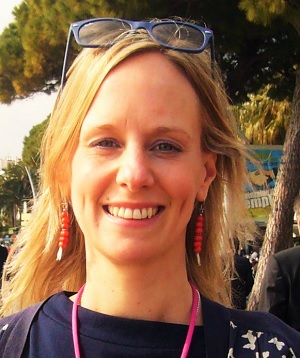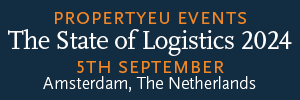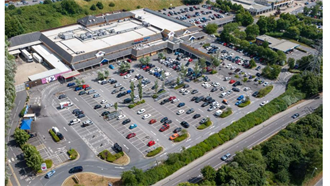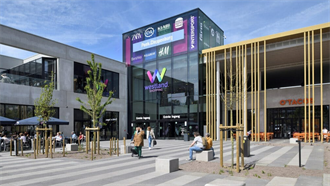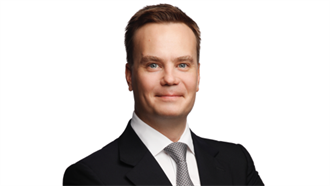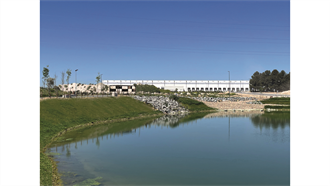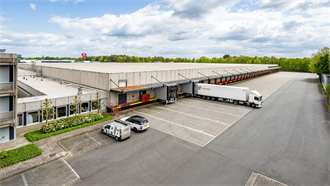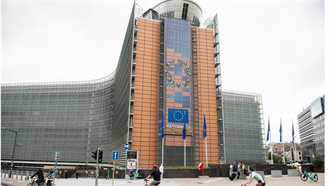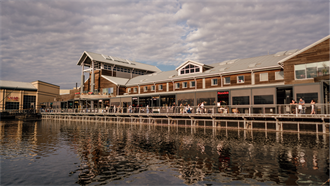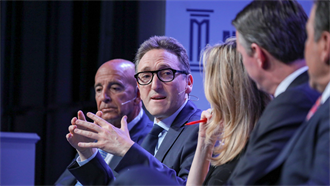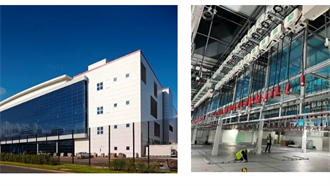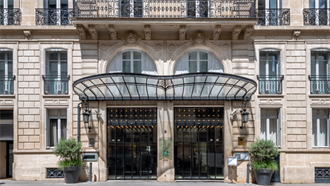Aareal Bank’s Christof Winkelmann tells PropertyEU how the lender has navigated market turmoil and a recent takeover in preparation for the next real estate cycle.
Germany’s Aareal Bank chose 2023 – its 100th year of operations – for the biggest deal in its history. The voluntary takeover of the Wiesbaden-headquartered lender, which focuses on real estate in over 20 countries, came after four years of unrest caused by activist shareholders who questioned the bank’s direction and the fate of its digital arm, Aareon.
Yet this summer, a vehicle managed by Advent International and Centerbridge Partners assumed control of 90% of the commercial lender, after both the management and supervisory boards granted their support for the deal. The takeover is based on an investment agreement to underpin the group’s strategy, and has sparked ‘a sense of eagerness and curiosity about what is to come, as is natural after any major change,’ says Christof Winkelmann, chief markets officer and a member of the management board, who has been with the firm for over 20 years.
While navigating the last few bumpy years of attacks from within, it is clear that the board of Aareal has also been defending its long-term business model from outside shocks. Between the pandemic and soaring inflation, economic distress and war in Europe, any lender dealing with real estate in the past four years has had to double down on its underwriting. and ready for further delinquencies. Banking failures earlier this year in the US and even in Europe with the fall of Credit Suisse reminded the institutional landscape that no-one is too big to fail, even as market volatility rumbles on.
Notes Winkelmann: ‘If you change base rates from close to zero to around 5%, as has happened in Europe and the US, mathematically speaking you are going to have tighter coverage and challenges emerging in certain sectors.’
Some aspects of business have proved more costly to manage than others. While the bank reported healthy operating profit of €239 mln in 2022, this would have been higher but for the expensive burden of the war in Ukraine. Loans against an office complex in Moscow – on which cash transfers out of Russia were hindered after the onset of the conflict, due to sanctions – cost the bank €134 mln last year.
Unsurprisingly, this year, Aareal bit the bullet and invested in an early termination of that Russian exposure, which, in addition to a further reduction of the group’s NPL inventory, including write-downs on US office loans, and efficiency measures at Aareon cost another €220 mln in the first half of 2023. Impressively, the bank still registered operating profit of €87 mln as the portfolio grew by roughly €1 bn year-on-year and deposits bulged in the higher interest rate environment.
Managing cycles
Is the adverse macroeconomic arena good for business in some ways? ‘We believe that downturns – if adjusted for risk and price – offer attractive opportunities if you are a specialist in your field,’ says Winkelmann, referencing both Aareal’s performance and the strategies of its successful clients. ‘Real estate is a cyclical business, and a bank needs to demonstrate that it can sustain performance in down cycles as well. The numbers for the last couple of years show that we are able to increase interest income.’ All that means that Aareal confirmed its profit targets for this year, although it now expects higher loan losses than originally envisaged.
This relates in part to its ongoing exposure to the US’ beleaguered office market, which Winkelmann says Aareal ‘is working on’. Earlier this year, EBA data suggested that Aareal has a circa €4.2 bn exposure to the North American office market. Winkelmann remarks that the firm’s track record of lending against offices there reflects the size of the asset class in the US: ‘We at Aareal always had been very selective about new business, but the market structure is also reflected in our portfolio,’ he notes.
One positive aspect to Aareal’s books, on both sides of the Atlantic, is the fact that the bank ‘is not active in the construction business’, he says. As a slate of German developers hits the wall, amid ongoing high construction costs and materials shortages, Aareal and its clients rather benefit from a certain upside: narrowing development pipelines and restricted supply. ‘In the context of office market dynamics, that means that cities will have time to digest vacancies which could contribute to the outlook for the sector improving,’ he notes.
Asset class appetite
Has all this turned Aareal sour on offices as an asset class? Far from it, Winkelmann stresses. ‘As a lender, we are in the real estate business for the long term. We have a clear risk appetite framework and manage our portfolio through cycles. We won`t exit and enter asset classes tactically, as our clients rely on us to be there throughout the cycle.’
He adds: ‘In downturns like the present one, debt coverage ratios on all loans are tighter because of interest rates. If you couple that with the fact that some industries are still recovering from Covid, certain assets are having a tougher time.’
Yet, he underlines, ‘some of our clients like downturns because they can pick up assets that others prefer to stay away from. Certain clients buy at both ends of the cycle, so we are prepared to support our clients to be successful throughout the cycle. Our approach is more about nuance in underwriting the deals.’
Hospitality, one of Aareal Bank’s areas of strength, is a good example. ‘We had a lot of hotels activity during Covid, even though most of the hotels were closed during the pandemic. We were firm believers that hotels would be very much needed again when travel resumed.’
Aareal’s strong focus on hospitality is reflected in a deal confirmed just days prior to the interview, with the bank financing Villa Copenhagen Hotel in the Danish capital to the tune of €103 mln.
The firm also continues to loan against a full range of asset classes, including student housing, co-living, retail, offices and logistics.
‘Logistics is very popular and was a clear opportunity during Covid; the sector is partially still undersupplied to this day, as many of the drivers remain in place. But we’re also lending against assets like retail properties, as long as they have the right fundamentals.’
Like many of the bank’s clients, Aareal firmly believes in assets positioned in the ‘right location, of the right quality, with the right operational metrics’. And for the right properties in the right cities, loan terms haven’t drastically changed in the current environment. Ticket sizes are largely similar, although value declines in certain cases have naturally diminished loan amounts. Loan to value rates (LTVs) are generally in the 50-55% range with highs and lows of 60% and 45%.
Competition for deals
One hallmark of the present, sluggish transactions market has been the emergence of more funds creating debt platforms, while dedicated alternative lenders continue to proliferate. Does Aareal fear the increased competition or welcome the diversity? Winkelmann sees the phenomenon from a different perspective. ‘This more diverse lending environment has been present for a long time in North America, where there’s a large mix of lenders, with everything from debt platforms to CMBS. It’s simply part of the industry – everyone has their sweet spot, and everyone faces a degree of competition,’ he notes.
Winkelmann argues that the debt fund business isn’t quite as rewarding as it might seem from a peremptory glance at the promised returns. Firstly, there is plenty of competition in the fixed income markets for investor capital. Secondly, investors scrutinising headline returns for the funds have to account for higher base interest; Winkelmann counsels a focus on the spreads. ‘Psychologically, it can look like the returns are decent, making it easier to raise money for debt funds, but it’s not always that great a deal.’
While he concedes that there is currently less lending activity from many traditional banks due to perceived market turmoil, allowing some alternative lenders to step into the space, on the whole they are not direct competition for Aareal. ‘They are generally interested in smaller ticket sizes,’ he says, noting that specialisms range from ‘senior to mezzanine, to the full capital stack’. He adds: ‘We sometimes see them as a useful addition to the capital stack as they contribute a risk position that we wouldn’t offer.’
Overall, it seems that Aareal has an optimistic view on the market outlook as the real estate industry gears up for the final quarter of 2023. Winkelmann is phlegmatic. ‘We’ve been talking about a crisis for two years,’ he says. ‘In Europe, hotels are full, restaurants are full, flights cost twice as much as last year. Clearly, it’s not all been plain sailing, but we can deal with it.’
*****
Seizing the bank: the takeover of Aareal
Towards the end of May, the European Central Bank (ECB) greenlit the voluntary takeover of Aareal Bank by a consortium of investors including Advent International Corporation, Centerbridge Partners, and the CPP Investment Board Europe. The rubber stamp from the financial authority concluded over four years of activist power struggles for the bank’s assets, with the takeover largely seen as the logical solution for Aareal to move forward with its business strategy, while maintaining control of its profitable digital subsidiary, Aareon.
The takeover vehicle, Atlantic Bidco, secured around 84% of Aareal Bank shares at an offer price of €33.00 per share during the process, which, alongside previously bought stocks, brought the ownership of Advent and Co. to around 90% of the firm’s share capital.
For the bank, it may have seemed the only way to quell recent years of shareholder rebellion and keep the company together.
In 2019, hedge fund investor Teleios Capital Partners, which owned around 3.4% of the company at the time, asked Aareal to explore the spin-off of Aareon, its successful software unit, as rumours emerged that Aareal was talking to potential investors. When Teleios increased its stake to 4.5%, and later 6%, it reiterated its calls to fully separate Aareon from its parent company to realise its value. At the same time, the firm argued that a partial sale of the unit, which had proved a potent money-spinner, would only hamper Aareon’s progress.
Nevertheless, in August 2020, Aareal struck a deal with Advent to divest a 30% stake in Aareon to the US-based private equity firm for some €260 mln in cash. According to market voices at the time, Advent beat out private equity peers including EQT, Blackstone, and Bain Capital to the Aareon stake.
If Aareal hoped that shareholder talk would then subside, it was mistaken. Petrus Advisers proved another thorn in the bank’s side, as the shareholder called for the spin-off of Aareal’s now 70% stake in Aareon and questioned the ongoing absence of CEO Hermann Merkens, who had been on medical leave for a considerable spell. Merkens eventually resigned in April 2021, to be replaced by Jochen Klösges in September of that year.
As hostile chat continued off-stage, Aareon stakeholder Advent pooled a group of investors to launch a takeover bid for Aareal in November 2021. The activists derided the offer, with Adam Epstein, Teleios' co-founder, stating: ‘Aareal is not a Christmas present for the board to give away,’ and adding that Teleios would act to ensure that the bank's board staged ‘a professional, structured sale process in the new year’.
By February it was clear that the bid had failed to reach an acceptance threshold of 60% and both Petrus and Teleios wrote letters to the supervisory board demanding the resignation of chairman Hermann Wagner. In response to the letters, Aareal queried why some minority shareholders apparently wanted to break up the bank. ‘A liquidation of the company with the sale of the individual components is not a sustainable strategy,’ it said. Noted Klösges: ‘We supported the offer because from a strategic perspective, it was in the best interests of the company and its stakeholders.’
Aareal survived this attack too, and when the takeover vehicle, Atlantic BidCo, renewed its offer in April 2022 at an increased price of €33.00 per share, the bank once again urged shareholders to accept. This time, the attempt met a successful conclusion in June 2023, when the consortium superseded the 60% acceptance threshold. Petrus and Teleios were amongst the shareholders that conceded their stakes.

